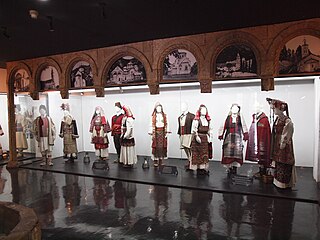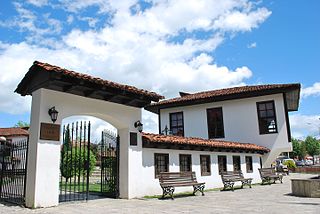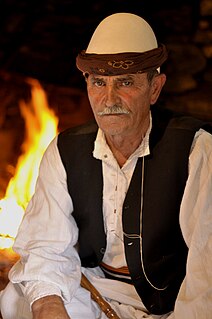 W
WKosovo is a partially recognized state and disputed territory located in the Balkan Peninsula in Southeastern Europe. The majority of Kosovars are ethnically Albanian. Kosovo has an expansive cultural heritage, including monuments, clothing items, museums, and traditional food.
 W
WGjakova has been populated since the prehistoric era. During the medieval period, in 1485, Gjakova is mentioned as a village, concretely as a market place. Gjakova served as a trading center on the route between Shkodër and Istanbul.
 W
WGjakova has been populated since the prehistoric era. During the medieval period, in 1485, Gjakova is mentioned as a village, concretely as a market place. Gjakova served as a trading center on the route between Shkodër and Istanbul.
 W
WKosovo Ballet was established in 1972. Since its inception, there have been two main generations of the company. They are known as the "First Generation" and the "Second Generation", which is also known as the new generation. The First Generation refers to the founding members of Kosovo Ballet who performed with the company until its forced disbanding. The Second Generation refers to the group of dancers who trained under Ahmet Brahimaj to reform Kosovo Ballet following the Yugoslav Wars.
 W
WThe Monumental Complex of the Albanian League of Prizren is a museum complex and cultural heritage monument located in the historic city of Prizren, Kosovo. This monument belongs to the "architectural" category, approved with number 414/77 and is under state protection. The Complex is now home to photographs, documents, objects, clothings and other cultural artifacts that date from the time of the League of Prizren.
 W
WThe Old Bazaar in Gjakova is the oldest bazaar in Kosovo (also known as Çarshia e Madhe or Dakovica. Mëhalla e Hadumit, the historical neighborhood where it is located also houses the city's oldest mosque, the Hadum Mosque, which dates from the 15th century.
 W
WThe University of Pristina is a public university located in Pristina, Kosovo. It is the institution that emerged after the disestablishment of the University of Pristina (1969–99) as a result of the Kosovo War. The inauguration of the university was a historical occurrence not only for the people of Kosovo, but for the whole Albanian nation. On 15 February, the solemn Parliament session took place, which is also proclaimed as The University of Pristina's Day. In the composition of the newly established University of Pristina were faculties with their headquarters in Pristina: the Faculty of Philosophy, Faculty of Law and Economics, Faculty of Engineering and Faculty of Medicine. Now the University of Pristina has 17 faculties, of which 14 are academic faculties, and 3 are faculties of applied sciences. Contained within the emblem is a translation of the name into Latin, Universitas Studiorum Prishtiniensis.
 W
WThis is a list of public holidays in Kosovo.
 W
WThe qeleshe, plis, qylaf or kësul, pi lisi in Albanian meaning 'woolen', is a white brimless felt cap traditionally worn by Albanians. It has spread throughout Albanian-inhabited territories, and is today part of the traditional costume of the Albanians. The height of the cap varies region to region.
 W
WTonibler is a male given name in Kosovo, given in honour of former British Prime Minister Tony Blair following his role in the 1999 NATO air campaign against the Federal Republic of Yugoslavia during the Kosovo War. The conflict had seen widespread persecution of ethnic Albanians in Kosovo as Kosovo sought to gain independence from Yugoslavia. Blair was credited as being instrumental in ending the conflict, and boys born following the war were sometimes given the name Toni or Tonibler.
 W
WTraditional clothing is one of the factors that has differentiated this nation from neighboring countries, dating back as far as the Illyrian era.